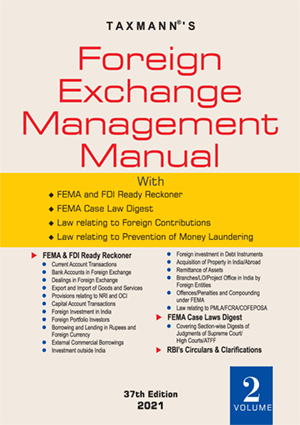Person Resident in India under FEMA
- Blog|FEMA & Banking|
- 3 Min Read
- By Taxmann
- |
- Last Updated on 17 November, 2022
Background:
FEMA makes clear distinction between resident and non-resident. ‘Person’ includes an individual, HUF, company, firm, an association of persons and any agency, office or branch owned or controlled by such person.- section 2(u) of FEMA.
A person resident in India:
-
- A person residing in India for more than 182 days during the course of preceding financial year. However, it does not include a person who has gone out of India or who stays outside India for employment outside India or carrying on business or vocation outside India or for any other purpose, in such circumstances as would indicate his intention to stay outside India for an uncertain period.
- A person residing in India for more than 182 days during the course of preceding financial year. However, it does not include a person who has come to or stays in India, in either case, otherwise than
-
- He has come for or taking employment in India
- For carrying on business or vocation in India
- For any other purpose, in such circumstances, as would indicate his intention to stay in India for an uncertain period.
-
- Any person or body corporate registered or incorporated in India.
- An office, branch or agency outside India owned or controlled by a person resident outside India
- An office, branch or agency outside India owned or controlled by a person resident in India.
Person residing for less or more than 182 days in the Previous year:
If a person stayed in India during 2001-2002 for less than 182 days, he will not be a ‘resident’ during 2002-03 even if he resides in India for more than 182 days in that year, as what is relevant is ‘preceding year’. However, if he resides in India for over 182 days in 2002-03, he will be ‘resident’ in 2003-04.
But if he leaves India for the purpose of taking up employment outside India during 2003-04, or for any other purpose as business/vocation outside India, or for any other purpose as would indicate his intention to stay outside India for an uncertain period, he would cease to be person resident in India from the date of his departure.
Even if a person is a foreign citizen, if he has not left India for any of aforesaid purposes during 2003-04, he would be considered, ‘person resident in India’ during the financial year 2003-04.
Difference between Stay and Reside:
There is distinction between ‘stay’ and ‘reside’. ‘Stay’ means physical presence in India while ‘reside’ indicates permanency. Thus, even if an airplane pilot ‘stays’ in India for more than 182 days during his transit travel, it cannot be said that he ‘resides’ in India.
Difference between income tax and FEMA Provisions:
One major distinction between Income Tax and FEMA provisions is that for purpose of Income Tax, purpose of stay (in India or abroad) is not relevant, only duration of stay is relevant.
Person going out for certain/uncertain period:
If a person stays in India for over 182 days during financial year 2001-02 but goes out next year on 10-08-2002 for employment, business, or any other purpose with intention to stay outside India for uncertain period, he will not be considered ‘resident’ during 2002-03 from the day he leaves India. However, if he goes abroad for a certain period and stays abroad, he will be treated as ‘resident’ in 2002-03, even if his stays in India was less than 182 days in 2002-03.
The reason is that he has gone out for a specific period and his stay in previous year was more than 182 days. However, in 2003-04, he will not be ‘resident’ as he did not stay in India for more than 182 days during 2002-03. If a person leaves India on 1-03-2003 to take up the employment abroad, he will be considered as a person resident outside India w.e.f. 1-3-2003 for the financial year April 2002 – March 2003, even though his stay in India was for more than 182 days.
Disclaimer: The content/information published on the website is only for general information of the user and shall not be construed as legal advice. While the Taxmann has exercised reasonable efforts to ensure the veracity of information/content published, Taxmann shall be under no liability in any manner whatsoever for incorrect information, if any.

Taxmann Publications has a dedicated in-house Research & Editorial Team. This team consists of a team of Chartered Accountants, Company Secretaries, and Lawyers. This team works under the guidance and supervision of editor-in-chief Mr Rakesh Bhargava.
The Research and Editorial Team is responsible for developing reliable and accurate content for the readers. The team follows the six-sigma approach to achieve the benchmark of zero error in its publications and research platforms. The team ensures that the following publication guidelines are thoroughly followed while developing the content:
- The statutory material is obtained only from the authorized and reliable sources
- All the latest developments in the judicial and legislative fields are covered
- Prepare the analytical write-ups on current, controversial, and important issues to help the readers to understand the concept and its implications
- Every content published by Taxmann is complete, accurate and lucid
- All evidence-based statements are supported with proper reference to Section, Circular No., Notification No. or citations
- The golden rules of grammar, style and consistency are thoroughly followed
- Font and size that’s easy to read and remain consistent across all imprint and digital publications are applied




 CA | CS | CMA
CA | CS | CMA
